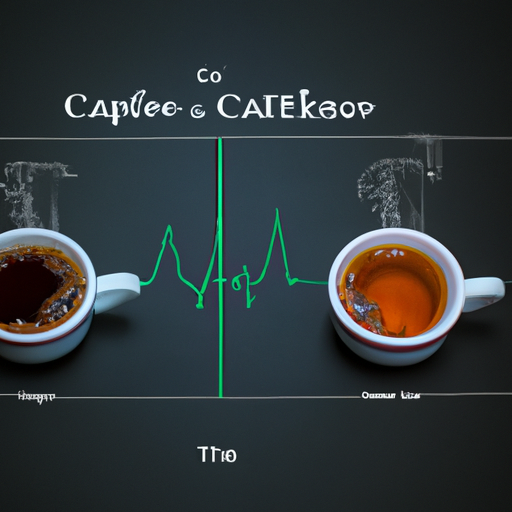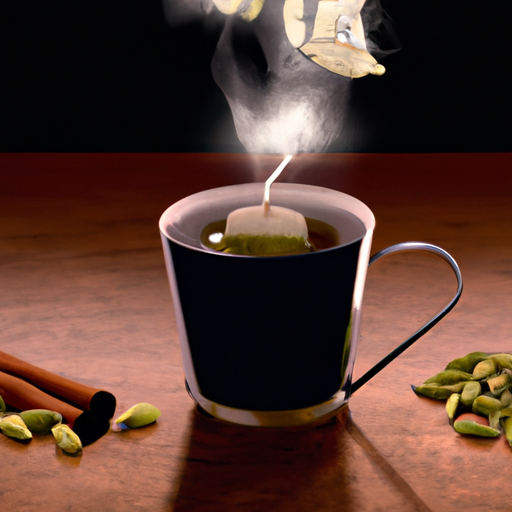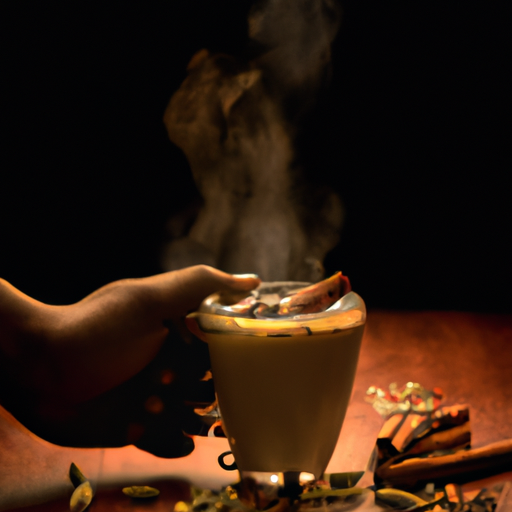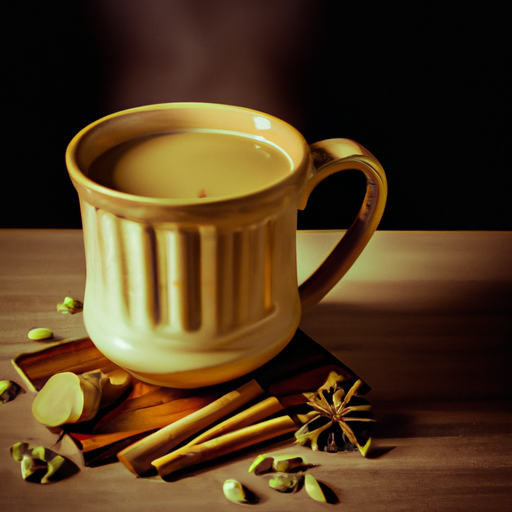As someone passionate about coffee, I usually depend on this warm drink to stay alert and full of energy during the day. But, I’ve recently found chai tea to be a great alternative source of caffeine, which additionally offers many health advantages.
This led me to wonder about the caffeine content in chai tea compared to coffee.
In this article, we will explore the differences in caffeine content between these two popular beverages. We will look at various factors that affect caffeine levels and examine the potential health benefits and risks of consuming caffeine.
By the end of this article, you will have a better understanding of how much caffeine is present in chai tea versus coffee and be able to make informed choices about which beverage to consume based on your personal preferences and needs.
Key Takeaways
- Coffee generally contains higher concentrations of caffeine compared to chai tea.
- The caffeine content in chai tea can vary depending on factors such as brewing time and type of tea leaves used.
- Chai tea contains less caffeine than coffee, but individuals vary in sensitivity to caffeine.
- Choosing between chai tea and coffee comes down to personal taste preference and individual tolerance for caffeine, with chai tea offering a unique blend of spices and potential health benefits.
Understanding Caffeine Content
You’ll want to know how much caffeine you’re getting from your drink, so let’s compare the caffeine content of chai tea and coffee. Understanding caffeine content is important because it affects our mood, energy levels, and overall health.
It’s also helpful to know that there are decaffeinated options and caffeine-free beverages available for those who are sensitive to or trying to limit their caffeine intake. Decaffeinated options offer a way to enjoy the taste of coffee or tea without the stimulating effects of caffeine. Decaffeination methods vary, but generally involve removing most of the caffeine from the beans or leaves through a chemical process.
Caffeine-free beverages like herbal teas or fruit juice blends can also be a good alternative for those who want to avoid caffeine altogether. Moving forward into discussing the actual amounts of caffeine in chai tea versus coffee, it’s important to note that both drinks contain varying levels of this stimulant. However, coffee tends to have higher concentrations than chai tea due to its preparation method and type of bean used.
Caffeine Content in Coffee
As a coffee lover, I’m always curious about the caffeine content of different types of coffee and how brewing methods affect it.
Some types of coffee have higher caffeine content than others, and the way they are brewed can also impact the amount of caffeine in your cup.
But what if you want to enjoy your morning cup without feeling jittery? There are also ways to reduce caffeine in your coffee, which we’ll explore in this subtopic.
Types of Coffee and Their Caffeine Content
Did you know that different types of coffee have varying amounts of caffeine content? For instance, non-espresso based coffee like drip coffee and French press contain more caffeine than espresso. The longer the brewing time, the higher the caffeine content. On average, a cup of drip coffee has about 95 mg of caffeine while a shot of espresso contains only around 63 mg.
Similarly, there are also various types of chai blends available in the market, each with their unique blend of spices and tea leaves. Although chai tea is not as popular as coffee in terms of caffeine intake, it still contains some amount of caffeine depending on its blend. Generally speaking, a cup of chai tea made from black tea leaves contains around 47 mg to 70 mg per eight-ounce serving. However, herbal teas or those made from green or white tea leaves may contain little to no caffeine at all.
With this knowledge about the varying levels of caffeine present in both coffee and chai tea blends, let’s explore how brewing methods can further impact our daily dose of energy boosters!
The Impact of Brewing Methods
Get ready to experience a whole new level of flavor and aroma as we delve into the impact that brewing methods have on your daily cup of joe or chai. The way you brew your coffee or steep your tea can greatly affect the caffeine content, taste, and overall quality of your drink. When it comes to chai tea, the caffeine levels vary depending on the type of tea blend used and how it is brewed.
Water temperature and steeping time are two key factors that determine the strength of your chai or coffee. For example, using boiling water for black tea blends will extract more caffeine compared to green or herbal teas which require cooler temperatures. Similarly, longer steeping times will increase caffeine levels in both drinks. Additionally, loose leaf teas tend to be stronger than their pre-packaged counterparts due to larger surface area exposure during brewing. Overall, understanding these variables can help you tailor your brewing method according to preference and reduce unnecessary caffeine intake.
Now let’s move onto some tips on how to reduce caffeine in coffee without compromising taste!
How to Reduce Caffeine in Coffee
Sipping on a warm cup of coffee is like wrapping yourself in a cozy blanket on a cold winter day, but what if you want to reduce the jitters without sacrificing flavor? Luckily, there are alternative options to consider.
One option is to switch from regular coffee to decaf coffee. Decaf coffee has almost no caffeine content and still provides the rich taste of regular coffee. Another option is to try herbal teas, which offer various health benefits and come in many different flavors. Some popular options include peppermint tea, ginger tea, and chamomile tea.
Reducing caffeine intake can lead to improved sleep quality, reduced anxiety levels, and lower blood pressure. It’s important to note that while reducing caffeine intake can have health benefits, it’s still important to consume enough caffeine for optimal cognitive function throughout the day.
In the subsequent section about caffeine content in chai tea, we’ll explore how this popular beverage compares with coffee in terms of caffeine content.
Caffeine Content in Chai Tea
You’ll be surprised to know that chai tea packs a punch with its caffeine content, making it a great alternative for those looking for a strong pick-me-up without relying on coffee. While the amount of caffeine in chai tea can vary depending on factors such as brewing time and type of tea leaves used, it generally contains around 25-50 mg of caffeine per cup. This is significantly less than the roughly 95 mg found in an average cup of coffee.
But don’t let the lower caffeine content fool you – chai tea has plenty of benefits beyond just providing a quick energy boost. For one, it’s packed with antioxidants that help protect against cell damage and inflammation. Chai tea also comes in a variety of delicious flavors, from classic spiced blends to more unique options like chocolate or vanilla.
So next time you’re looking for something to wake you up in the morning or keep you going throughout the day, consider reaching for a cup of chai instead of your usual coffee. Plus, with so many different flavor options available, it’s easy to find one that suits your taste preferences. Speaking of preferences, there are several factors that can affect the caffeine content in both chai tea and coffee – let’s take a closer look at those next.
Factors That Affect Caffeine Content
In my research on the caffeine content in chai tea, I discovered that the amount of caffeine can vary depending on several factors. While it’s generally considered to have less caffeine than coffee, the exact amount can be influenced by things like the roasting process and tea blend used.
One factor that affects caffeine content in chai is the roasting process of any spices or herbs included in the blend. This can impact their potency and thus alter the overall caffeine levels.
Additionally, different types of teas may be used in a chai blend, with black tea being one of the most common. However, even within this category, variations such as grind size and water temperature during steeping can have an impact on how much caffeine is extracted.
Overall, while there may not be a definitive answer as to how much caffeine is present in every cup of chai tea due to these variables, it’s clear that factors such as roasting process and tea blend do play a role. Understanding these nuances can help individuals make informed choices about their beverage choices based on their preferences for taste or desired effect.
As we move into discussing health benefits related to consuming caffeine, it’s important to keep these variations in mind when considering potential effects.
Health Benefits of Caffeine
If you’re a regular caffeine drinker, your morning cup of joe might be doing more than just waking you up. For example, studies have shown that moderate caffeine consumption can potentially decrease the risk of developing certain types of cancer. Additionally, caffeine has been found to improve mental alertness and cognitive function. This is why many people rely on it to help them power through long workdays or study sessions.
However, it’s important to note that consuming too much caffeine can lead to addiction and withdrawal symptoms. Caffeine addiction occurs when the body becomes dependent on caffeine to function properly. When someone who is addicted to caffeine tries to quit or cut back their intake, they may experience symptoms such as headaches, fatigue, irritability, and difficulty concentrating.
To give an idea of how much caffeine is in common drinks, here’s a table:
| Beverage | Caffeine Content (mg) |
|---|---|
| 8 oz brewed coffee | 95-165 |
| 8 oz chai tea latte | 25-70 |
| 12 oz soda | 30-40 |
As you can see from the table above, chai tea contains significantly less caffeine compared to coffee. However, this doesn’t mean that one should switch from coffee to chai tea without caution. It’s still important for individuals to monitor their overall daily caffeine intake in order to avoid negative side effects.
Moving onto the next section about risks and side effects of caffeine…
Risks and Side Effects of Caffeine
I want to discuss the potential risks and side effects of caffeine. These include anxiety and jitters, insomnia and sleep disturbances, and increased heart rate and blood pressure. It’s important to consider these factors when consuming caffeinated beverages like coffee or tea.
It’s essential to be aware of the potential negative effects that caffeine can have on our bodies. This way, we can make informed decisions about our consumption habits.
Anxiety and Jitters
Feeling anxious and jittery after drinking chai tea or coffee? You’re not alone! Caffeine, found in both beverages, can increase heart rate and cause feelings of nervousness and restlessness. However, there are ways to manage anxiety caused by caffeine consumption.
One option is to switch to caffeine-free alternatives such as herbal teas or decaf coffee. Another approach is to gradually reduce your caffeine intake over time until you reach a level that doesn’t cause anxiety. It’s also important to pay attention to the amount of caffeine consumed throughout the day and avoid consuming large amounts in a short period of time.
By managing anxiety caused by caffeine, you can still enjoy your favorite beverages without feeling overwhelmed or uncomfortable.
Transitioning into the subsequent section about insomnia and sleep disturbances, it’s worth noting that excessive consumption of caffeine can also lead to difficulty sleeping. Let’s explore this topic further.
Insomnia and Sleep Disturbances
Consuming caffeine late in the day can make it difficult to catch some Z’s, leaving you tossing and turning like a ship lost at sea. Chai tea contains less caffeine than coffee, but it still has enough to potentially disrupt your sleep. If you’re struggling with insomnia or other sleep disturbances, managing your caffeine intake is an important step towards getting a better night’s rest.
In addition to interfering with your sleep, excessive caffeine consumption can also have negative effects on mental health. Studies have shown that high levels of caffeine intake are associated with increased anxiety and jitteriness. By limiting your intake of caffeinated beverages like chai tea and coffee later in the day, you can help manage these symptoms and improve your overall well-being.
Transitioning into the next section about ‘increased heart rate and blood pressure’, it’s important to note that these physical effects are also linked to excessive caffeine consumption.
Increased Heart Rate and Blood Pressure
Your heart may start racing and your blood pressure may spike after consuming too much caffeine, causing you to feel anxious and on edge. This is why it’s important to be mindful of how much caffeine you consume, whether it’s in the form of chai tea or coffee.
While moderate caffeine intake can have positive effects on hydration and exercise performance, excessive consumption can lead to negative outcomes such as dehydration and decreased exercise capacity. It’s important to note that the amount of caffeine in chai tea varies depending on the recipe and brand, but generally contains less caffeine than a cup of coffee.
However, individuals vary in their sensitivity to caffeine, so it’s best to pay attention to your body’s reaction when consuming either drink. Ultimately, choosing between chai tea and coffee comes down to personal taste preference and individual tolerance for caffeine.
Choosing Between Chai Tea and Coffee
When it comes to deciding between a warm cup of chai tea or a bold coffee, you’ll have to weigh the pros and cons. Both drinks contain caffeine, which can give you that much-needed energy boost to start your day. However, there are some key differences to consider when choosing between these two popular beverages.
Here are some factors to keep in mind:
-
Taste preferences: Chai tea has a unique blend of spices that give it a warm and comforting taste, while coffee is known for its rich and bold flavor.
-
Health benefits: Chai tea contains antioxidants and anti-inflammatory properties that may help lower cholesterol levels and reduce inflammation in the body. Coffee has been linked to improved cognitive function, decreased risk of type 2 diabetes, and reduced risk of liver disease.
-
Caffeine content: While both drinks contain caffeine, chai tea typically has less caffeine than coffee. A typical cup of chai tea contains around 25-50mg of caffeine compared to 95mg in an average cup of coffee.
Considering these factors can help you make an informed decision about which drink is right for you. If you prefer a less intense taste and want the potential health benefits from antioxidants and anti-inflammatory compounds found in chai tea with less caffeine content than coffee – then go ahead! But if bold flavors appeal more or you need higher doses for alertness purposes (such as studying), then choose coffee instead.
Now let’s talk about alternative sources for caffeine so that we can explore other options beyond just these two popular drinks.
Alternative Caffeine Sources
Looking for variety in your caffeine intake? There are plenty of alternative sources to explore beyond the typical tea and coffee options. Herbal alternatives, such as peppermint or chamomile tea, have little to no caffeine content. Drinking these can help you relax and unwind without the jitters that come with a caffeine rush.
If you’re looking for something with more flavor but still want to avoid caffeine, decaf options are readily available. Decaf coffee or tea is made by removing most of the caffeine content through a chemical process. While some small amounts may remain, it’s significantly less than a regular cup of coffee or tea.
For those who still crave the energy boost from caffeine but want to switch up their routine, there are other sources like matcha green tea or yerba mate. These beverages contain varying levels of caffeine depending on how they’re prepared and consumed. For example, matcha contains about 70 mg of caffeine per cup compared to 95 mg in an average cup of coffee. Yerba mate has around 30-50 mg per cup.
Transitioning into tips for reducing caffeine intake, it’s important to remember that moderation is key when it comes to any substance consumption. Experimenting with different alternatives can help you find what works best for your body and lifestyle without sacrificing taste or enjoyment.
Tips for Reducing Caffeine Intake
To cut back on your caffeine intake, consider gradually decreasing the amount of caffeinated beverages you consume and replacing them with herbal teas or decaf options. Here are some tips for reducing your caffeine intake and incorporating more caffeine-free alternatives into your daily routine:
-
Start by tracking how much caffeine you currently consume each day. This will help you identify which beverages or foods contain the most caffeine and where you can make adjustments.
-
Experiment with different herbal tea alternatives that are naturally caffeine-free, such as chamomile, peppermint, or rooibos tea. These teas offer a variety of flavors and health benefits without the added jolt of caffeine.
-
Expand your beverage options beyond tea by trying other types of naturally-caffeine free drinks, such as water, sparkling water with lemon or lime juice, coconut water, or fruit-infused water. These choices can help keep you hydrated throughout the day while also providing flavorful refreshment.
By taking small steps to slowly decrease your reliance on highly-caffeinated drinks like coffee and soda, you can improve your overall health and wellbeing while still enjoying a satisfying beverage experience with delicious herbal tea alternatives and other caffeine-free beverages.
Frequently Asked Questions
What are some common misconceptions about the caffeine content in chai tea and coffee?
As someone who’s studied the effects of caffeine on the body, I can tell you that there are many common misconceptions about the caffeine content in chai tea and coffee.
One of the biggest misconceptions is that coffee always contains more caffeine than chai tea. While it’s true that coffee generally has higher levels of caffeine per serving, this isn’t always the case.
Another misconception is that caffeine is bad for your health. While excessive amounts of caffeine can certainly cause problems, moderate consumption actually has several health benefits, including improved cognitive function and decreased risk of certain diseases like Alzheimer’s and Parkinson’s.
It’s important to remember that when it comes to caffeine consumption, moderation is key.
Can the caffeine content in chai tea and coffee vary depending on the brand or type?
I was curious about whether the caffeine content in chai tea and coffee can vary depending on the brand or type, so I did some research.
It turns out that there can be considerable caffeine variations between different brands and types of both beverages. For example, a study found that the caffeine content in brewed coffee ranged from 259 to 564 mg per 8 oz cup!
Similarly, chai tea can have varying amounts of caffeine depending on the ingredients used and how it is prepared. Additionally, taste differences can also affect how much caffeine someone perceives they’re consuming.
While many people associate strong flavors with high caffeine levels, this isn’t always the case. Overall, it’s important to pay attention to the specific brand and type of beverage you’re consuming if you’re trying to monitor your caffeine intake accurately.
Is it safe to consume caffeine while pregnant or breastfeeding?
As someone who’s currently pregnant or breastfeeding, you may be wondering if it’s safe to consume caffeine. While some studies have suggested that high levels of caffeine intake during pregnancy can lead to complications such as low birth weight and premature delivery, moderate consumption (about 300mg per day) is generally considered safe.
However, if you’re still concerned about the effects of caffeine on your body and your baby’s health, there are plenty of safe caffeine alternatives that you can explore. For example, chai tea is a delicious and healthy alternative to coffee that contains less caffeine but still provides a natural boost of energy.
Chai tea also has numerous health benefits such as reducing inflammation and promoting digestion. So if you’re looking for a tasty and nutritious way to stay energized throughout the day, consider swapping out your daily cup of coffee for a warm and soothing cup of chai tea instead!
How does the caffeine content in chai tea and coffee compare to other popular caffeinated beverages, such as energy drinks or soda?
Comparing caffeine levels: Chai vs Energy Drinks, Coffee vs Soda, it’s important to note that while chai tea and coffee both contain caffeine, their levels vary.
Chai typically contains less caffeine than coffee, with an average of 25-50mg per cup compared to 95mg in a standard cup of coffee.
However, the amount of caffeine in energy drinks and soda can be much higher, ranging from 80-500mg per serving depending on the brand and type.
The impact of caffeine on our bodies also varies based on factors such as age, weight, and overall health.
While moderate caffeine intake has been shown to have some health benefits such as improved cognitive function and decreased risk for certain diseases, excessive consumption can lead to negative side effects such as anxiety, insomnia, and increased heart rate.
It’s always important to consult with a healthcare provider about individual tolerance and safe levels of caffeine intake during pregnancy or breastfeeding.
Are there any cultural or historical significance to the consumption of chai tea or coffee in different parts of the world?
As someone who loves both chai tea and coffee, I’ve always been fascinated by the cultural significance and historical context surrounding these beverages.
Chai tea has deep roots in Indian culture. It is often referred to as ‘masala chai’ and is enjoyed as a daily ritual with family and friends. The combination of spices like cardamom, cinnamon, ginger, and cloves make it not only delicious but also medicinal.
On the other hand, coffee has a rich history in Africa and the Middle East before spreading to Europe and eventually becoming a global phenomenon. Initially consumed for its stimulating effects, over time it became associated with social gatherings and intellectual discussions.
Learning about the cultural significance and historical context of these beverages adds another layer of appreciation for their taste and enjoyment beyond just their caffeine content.
Conclusion
So, which is better for you: chai tea or coffee? The answer isn’t as straightforward as you might think. Both beverages have their own unique benefits and drawbacks.
While coffee has more caffeine than chai tea, it also has a higher risk of side effects such as jitters and headaches. On the other hand, chai tea contains antioxidants and spices that can aid in digestion and provide a host of other health benefits.
Ultimately, the choice between these two beverages will depend on your personal preferences and health needs. If you’re looking to reduce your caffeine intake but still want a pick-me-up, there are plenty of alternative sources of energy available. From herbal teas to exercise and hydration, there are many ways to boost your energy levels without relying on caffeine.
In conclusion, while both chai tea and coffee have their own unique benefits and drawbacks, the decision ultimately comes down to personal preference. By understanding the factors that affect caffeine content and being aware of potential risks and side effects, you can make an informed decision about which beverage is right for you.










